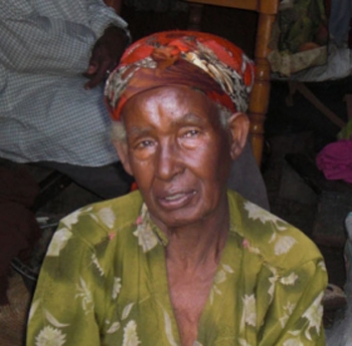Over 29 million readers and 3,000 blogs in 129 countries are all talking about one issue today: Water.
For this year’s Blog Action Day, the question is clear: Why do almost a billion people have no access to clean, safe drinking water? (That’s one in eight of us, by the way)
As an international development agency, this is an issue that HelpAge is looking at more and more. Throughout the countries we work in, the issue of water scarcity, provision, droughts and floods is most prevalent in Ethiopia.
This is not only because older people are suffering due to a lack of clean water, it is also but they can help access this precious resource thanks to their experience and knowledge.
Stagnant service
Ethiopia is a country with high population growth and urbanisation, but also an increasing economic growth. However, the water service provision has been stagnant compared to the rate of growth in other service areas.
The whole of Addis Ababa – the capital and one of the fastest growing cities in Africa – is experiencing significant water shortages. This is according to a recent study comissioned by Helpage International on the vulnerabilities and living condition of poor older people in Addis Ababa, for which over 1,000 older people were interviewed.
The figures speak for themselves:
79% of homeless older people get water by begging. 93% of all older people surveyed have no bath or shower. 71% of homeless older people use rivers or drains for washing and 29% do not wash.
 Battling to survive
Battling to survive
Tewabech Yimmam, 70, is one of the lucky older people in Addis Ababa – she is a home owner. But she has no access to water in her house. What is more, her daughter abandoned her three children aged between eight and 13 years for her Tewabech to care for. This means more water is needed and therefore more money.
There might be no rent due at the end of every month, but there is the expense of buying water from a nearby vendor for herself and three grandchildren. And then there is the burden of having to transport buckets of it daily.
She said: “I am getting weaker but I continue battling to survive as best as I can for as long as my strength allows me to.”
For many older Ethiopians, affording water is simply unthinkable. Based on the study mentioned above, the supply of water is one of the biggest problems faced by homeless older people.
Addis Ababa has many rivers, yet they are extremely polluted that drinking from them is putting one’s life at risk. This leaves older people with the choice of no water or begging for clean water.
Older people’s knowledge can help water provision
This picture is bleak, but as we know at HelpAge, even though older people face challenges and specific vulnerabilities, they also have unique skills and wisdom that can help in trying times.
In the Somali region of Ethiopia, older people’s knowledge and experience has proven to be superior to modern technology and surveying methods with regard to provision of water.
HelpAge International and local partner Aged and Children’s Pastoralist Association (ACPA) have been providing clean water, sanitation and hygiene facilities to 60,000 vulnerable drought affected older people and their families since late 2009. ACPA was the only organisation in the region that put to use the advice provided by the older people in its water construction.
Older people took the lead, helping to decide where latrines and wells should be built. As an ACPA field officer explained: “Older people are experts at knowing where to dig for water, and led us to the right place.”
Only about three weeks after the completion of the water construction, devastating floods occurred and destroyed all but HelpAge’s facilities that used the wisdom of older people. Since no environmental data was available for the Somali region, HelpAge took into consideration the advice of the older people that saved the project.
With such grave water shortages around the world, maybe it’s time that older people’s experience and traditional knowledge was taken more seriosuly.
Happy Blog Action Day to all – look forward to reading all your posts.
Find out more about Blog Action Day 2010
Read more about HelpAge’s work in Ethiopia
